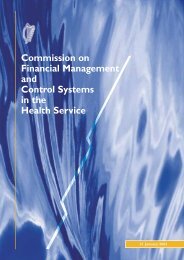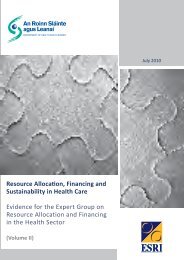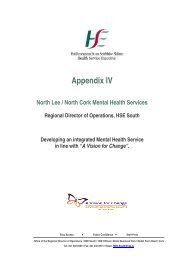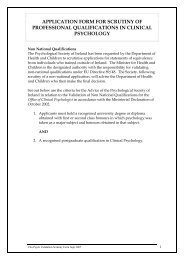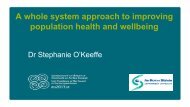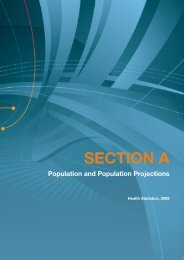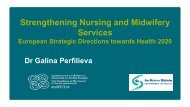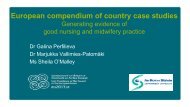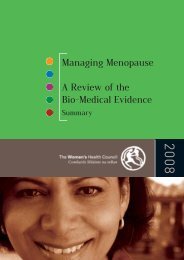- Page 1:
All Ireland Traveller Health Study
- Page 4 and 5:
All Ireland Traveller Health Study
- Page 6 and 7:
All Ireland Traveller Health Study
- Page 8 and 9:
All Ireland Traveller Health Study
- Page 10 and 11:
All Ireland Traveller Health Study
- Page 12 and 13:
All Ireland Traveller Health Study
- Page 14 and 15:
All Ireland Traveller Health Study
- Page 16 and 17:
All Ireland Traveller Health Study
- Page 18 and 19:
All Ireland Traveller Health Study
- Page 20 and 21:
All Ireland Traveller Health Study
- Page 22 and 23:
All Ireland Traveller Health Study
- Page 24 and 25:
All Ireland Traveller Health Study
- Page 26 and 27:
All Ireland Traveller Health Study
- Page 28 and 29:
All Ireland Traveller Health Study
- Page 30 and 31:
All Ireland Traveller Health Study
- Page 32 and 33:
All Ireland Traveller Health Study
- Page 34 and 35:
All Ireland Traveller Health Study
- Page 36 and 37:
All Ireland Traveller Health Study
- Page 38 and 39:
All Ireland Traveller Health Study
- Page 40 and 41:
All Ireland Traveller Health Study
- Page 42 and 43:
All Ireland Traveller Health Study
- Page 44 and 45:
xlii All Ireland Traveller Health S
- Page 46 and 47:
All Ireland Traveller Health Study
- Page 48 and 49:
All Ireland Traveller Health Study
- Page 50 and 51:
All Ireland Traveller Health Study
- Page 52 and 53:
All Ireland Traveller Health Study
- Page 54 and 55:
All Ireland Traveller Health Study
- Page 56 and 57:
All Ireland Traveller Health Study
- Page 58 and 59:
All Ireland Traveller Health Study
- Page 60 and 61:
All Ireland Traveller Health Study
- Page 62 and 63:
All Ireland Traveller Health Study
- Page 64 and 65:
All Ireland Traveller Health Study
- Page 66 and 67:
All Ireland Traveller Health Study
- Page 68 and 69:
All Ireland Traveller Health Study
- Page 70 and 71:
All Ireland Traveller Health Study
- Page 72 and 73:
All Ireland Traveller Health Study
- Page 74 and 75:
All Ireland Traveller Health Study
- Page 76 and 77:
All Ireland Traveller Health Study
- Page 78 and 79:
All Ireland Traveller Health Study
- Page 80 and 81:
All Ireland Traveller Health Study
- Page 82 and 83:
All Ireland Traveller Health Study
- Page 84 and 85:
40 All Ireland Traveller Health Stu
- Page 86 and 87:
All Ireland Traveller Health Study
- Page 88 and 89:
All Ireland Traveller Health Study
- Page 90 and 91:
All Ireland Traveller Health Study
- Page 92 and 93:
All Ireland Traveller Health Study
- Page 94 and 95:
All Ireland Traveller Health Study
- Page 96 and 97:
All Ireland Traveller Health Study
- Page 98 and 99:
All Ireland Traveller Health Study
- Page 100 and 101:
All Ireland Traveller Health Study
- Page 102 and 103:
All Ireland Traveller Health Study
- Page 104 and 105:
All Ireland Traveller Health Study
- Page 106 and 107:
All Ireland Traveller Health Study
- Page 108 and 109:
All Ireland Traveller Health Study
- Page 110 and 111:
All Ireland Traveller Health Study
- Page 112 and 113:
All Ireland Traveller Health Study
- Page 114 and 115:
All Ireland Traveller Health Study
- Page 116 and 117:
All Ireland Traveller Health Study
- Page 118 and 119:
All Ireland Traveller Health Study
- Page 120 and 121:
All Ireland Traveller Health Study
- Page 122 and 123:
All Ireland Traveller Health Study
- Page 124 and 125:
All Ireland Traveller Health Study
- Page 126 and 127:
All Ireland Traveller Health Study
- Page 128 and 129:
All Ireland Traveller Health Study
- Page 130 and 131:
All Ireland Traveller Health Study
- Page 132 and 133:
All Ireland Traveller Health Study
- Page 134 and 135:
All Ireland Traveller Health Study
- Page 136 and 137:
All Ireland Traveller Health Study
- Page 138 and 139:
All Ireland Traveller Health Study
- Page 140 and 141:
All Ireland Traveller Health Study
- Page 142 and 143:
All Ireland Traveller Health Study
- Page 144 and 145:
All Ireland Traveller Health Study
- Page 146 and 147:
All Ireland Traveller Health Study
- Page 148 and 149:
All Ireland Traveller Health Study
- Page 150 and 151:
All Ireland Traveller Health Study
- Page 152 and 153:
All Ireland Traveller Health Study
- Page 154 and 155:
All Ireland Traveller Health Study
- Page 156 and 157:
All Ireland Traveller Health Study
- Page 158 and 159:
All Ireland Traveller Health Study
- Page 160 and 161:
All Ireland Traveller Health Study
- Page 162 and 163:
All Ireland Traveller Health Study
- Page 164 and 165:
All Ireland Traveller Health Study
- Page 166 and 167:
All Ireland Traveller Health Study
- Page 168 and 169:
All Ireland Traveller Health Study
- Page 170 and 171:
All Ireland Traveller Health Study
- Page 172 and 173:
All Ireland Traveller Health Study
- Page 174 and 175:
All Ireland Traveller Health Study
- Page 176 and 177:
All Ireland Traveller Health Study
- Page 178 and 179:
All Ireland Traveller Health Study
- Page 180 and 181:
All Ireland Traveller Health Study
- Page 182 and 183:
All Ireland Traveller Health Study
- Page 184 and 185:
All Ireland Traveller Health Study
- Page 186 and 187:
All Ireland Traveller Health Study
- Page 188 and 189:
All Ireland Traveller Health Study
- Page 190 and 191:
All Ireland Traveller Health Study
- Page 192 and 193:
All Ireland Traveller Health Study
- Page 194 and 195:
All Ireland Traveller Health Study
- Page 196 and 197:
All Ireland Traveller Health Study
- Page 198 and 199:
All Ireland Traveller Health Study
- Page 200 and 201:
All Ireland Traveller Health Study
- Page 202 and 203:
All Ireland Traveller Health Study
- Page 204 and 205:
All Ireland Traveller Health Study
- Page 206 and 207:
All Ireland Traveller Health Study
- Page 208 and 209:
All Ireland Traveller Health Study
- Page 210 and 211:
All Ireland Traveller Health Study
- Page 212 and 213: All Ireland Traveller Health Study
- Page 214 and 215: All Ireland Traveller Health Study
- Page 216 and 217: All Ireland Traveller Health Study
- Page 218 and 219: All Ireland Traveller Health Study
- Page 220 and 221: All Ireland Traveller Health Study
- Page 222 and 223: All Ireland Traveller Health Study
- Page 224 and 225: All Ireland Traveller Health Study
- Page 226 and 227: All Ireland Traveller Health Study
- Page 228 and 229: All Ireland Traveller Health Study
- Page 230 and 231: All Ireland Traveller Health Study
- Page 232 and 233: All Ireland Traveller Health Study
- Page 234 and 235: All Ireland Traveller Health Study
- Page 236 and 237: All Ireland Traveller Health Study
- Page 238 and 239: All Ireland Traveller Health Study
- Page 240 and 241: All Ireland Traveller Health Study
- Page 242 and 243: All Ireland Traveller Health Study
- Page 244 and 245: All Ireland Traveller Health Study
- Page 246 and 247: All Ireland Traveller Health Study
- Page 248 and 249: All Ireland Traveller Health Study
- Page 250 and 251: All Ireland Traveller Health Study
- Page 252 and 253: All Ireland Traveller Health Study
- Page 254 and 255: All Ireland Traveller Health Study
- Page 256 and 257: All Ireland Traveller Health Study
- Page 258 and 259: All Ireland Traveller Health Study
- Page 260 and 261: All Ireland Traveller Health Study
- Page 264 and 265: All Ireland Traveller Health Study
- Page 266 and 267: All Ireland Traveller Health Study
- Page 268 and 269: All Ireland Traveller Health Study
- Page 270 and 271: All Ireland Traveller Health Study
- Page 272 and 273: All Ireland Traveller Health Study
- Page 274 and 275: All Ireland Traveller Health Study
- Page 276 and 277: All Ireland Traveller Health Study
- Page 278 and 279: All Ireland Traveller Health Study
- Page 280 and 281: All Ireland Traveller Health Study
- Page 282 and 283: All Ireland Traveller Health Study
- Page 284 and 285: All Ireland Traveller Health Study
- Page 286 and 287: All Ireland Traveller Health Study
- Page 288 and 289: All Ireland Traveller Health Study
- Page 290 and 291: All Ireland Traveller Health Study
- Page 292 and 293: All Ireland Traveller Health Study
- Page 294 and 295: All Ireland Traveller Health Study
- Page 296 and 297: All Ireland Traveller Health Study
- Page 298 and 299: All Ireland Traveller Health Study
- Page 300 and 301: All Ireland Traveller Health Study
- Page 302: 258 All Ireland Traveller Health St



